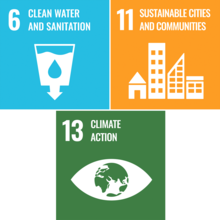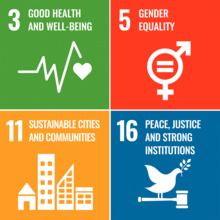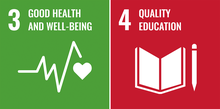The University of Minnesota Global Programs and Strategy Alliance (GPS Alliance) is pleased to announce the award, as part of its systemwide initiative focused on the Sustainable Development Goals (SDGs), of approximately $160,000 to eight research projects, four of which were jointly funded by the Office of Academic Clinical Affairs (OACA), that align with the United Nations’ 2030 Agenda for Sustainable Development, the University’s strategic priorities and needs identified by communities.
The projects were selected after a competitive proposal process that included an interdisciplinary committee reviewing the proposals and providing recommendations for funding. Research proposals were required to align with the SDGs, and priority was given to projects that tie into MPACT 2025 goals and incorporate partners to address local and/or global needs.
OACA Co-Funded Projects

Sustainable Development Goals: Ensuring Clean Water and Sanitation, Addressing Climate Change, and Improving Sustainable Communities via Predictive Wastewater Treatment in Rural Communities
Paige Novak, Principal Investigator
Department of Civil, Environmental, and Geo-Engineering, College of Science and Engineering, U of M Twin Cities
- Wastewater treatment protects the environment and human health. Conventional wastewater treatment is energy-intensive and complex, making it impractical for rural and under-resourced communities. “Low-tech” wastewater treatment technologies exist that can be leveraged globally for improved sanitation, such as wastewater treatment ponds, but unfortunately, the factors that control pond performance are poorly understood. Because the basis of operation for ponds is microbiological, studying the pond microbiome should allow us to determine the extent to which treatment performance is controlled by deterministic mechanisms, and within those factors under engineering control, which are the most important. Such an approach is far easier than performing large-scale time- and space-intensive sampling campaigns, yet should yield similar information. This research is addresses outcomes related to SDGs #6 and #11 while also touching on SDG #13.

Achieving Gender Equality for Women Experiencing the Deepest Vulnerability: A Focus on Gender-Based Violence in the Lives of Childbearing Refugee Women in Dzaleka Refugee Camp, Malawi
Lucy Mkandawire-Valhmu, Principal Investigator
Department of Population Health and Systems Cooperative, School of Nursing, U of M Twin Cities
- Gender equality is key to accomplishing all Sustainable Development Goals. Gender-based violence (GBV) is rooted in gender inequality and encompasses acts harmful to women that adversely affect their health outcomes. For refugee women of childbearing age, GBV has important implications for maternal morbidity and mortality and refugee women who flee to low-income countries like Malawi are faced with additional vulnerabilities associated with being located in a country already wrought by poor maternal health indicators related to gender inequality. This mixed methods study will provide foundational knowledge about the experiences of GBV in the lives of childbearing women living at Dzaleka refugee camp in Malawi. Findings will advance the development of future healthcare interventions and policies to promote and protect the health of childbearing women survivors of GBV in refugee camps and women resettled in states like Minnesota. The project directly supports outcomes tied to SDGs #3 and #5 while also addressing issues related to SDGs #11 and #16.

Assessment of Relevancy of Nurse Practitioner Entry-to-Practice Competencies in the Primary Health Care Systems of Sub-Saharan Africa
Dorcas Elisabeth Kunkel, Principal Investigator
School of Nursing, U of M Twin Cities
- The purpose of this research project is to assess the relevancy of an existing set of core competencies for training and practice of advanced practice nurses in primary health care contexts, in particular family nurse practitioners (FNP) in Liberia and for additional application in Sub-Saharan Africa. The project is built upon what was learned in previous educational initiatives in Liberia and will provide information for governmental, and non-governmental organizations and boards of nursing to begin to plan for context relevant, national, graduate level family nurse practitioner curriculum for programs of nursing in universities and colleges. These advanced practice nursing roles can begin to fill the profound gap that exists in the numbers of primary care providers in Liberia and across Sub-Saharan Africa. The FNP role has been shown to increase access to quality, safe, primary care for populations that have not had this access before. The project supports outcomes for SDGs #3 and #4.

Efforts in Global Food Security Education: Catalyzing Interdisciplinary Educator Professional Development Connecting Global Issues to Local Impact
Laura Rice, Principal Investigator
Department of Agricultural Education, Communications, and Marketing, College of Food, Agricultural and Natural Resource Sciences, U of M Twin Cities
- Many of the most pressing agricultural challenges are global in scope and impact. Resolving such challenges requires partnership and collaboration across borders and disciplinary boundaries. Teaching complex skills necessary for collaboration must begin in the educational system with highly-trained educators modeling the behaviors, and teaching students the connection between local action and global solutions. Developing strong communities of practice, whether face-to-face or digital, is a critical component of this work. Another key opportunity for improvement is effectively assessing the impact of interventions, offering the largest return on investment, in educator development. The funding available through this grant would enable advancement in teaching about Food Security in local contexts. In collaboration with the Global TeachAg Network, the proposed activities also foster exploration of the effectiveness of cultivated digital and face-to-face professional learning communities for educators interested in providing instruction about global food, fiber, and natural resources. The project supports outcomes for SDGs #2 and #4.
See the entire list of awarded projects which include teams from two U of M campuses, eleven departments/units and seven colleges/schools. In total,10 SDGs are represented across the eight projects.



